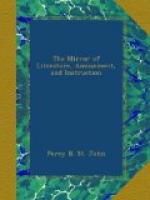It were needless, however, to travel to foreign countries in search of interesting localities. Our own island teems with them. In the metropolis and its environs, a diligent inquirer will find them at every step. How many coffeehouses and taverns are there in London which at one time or another have been frequented by celebrated characters, and how many houses in which others equally celebrated have resided; such as that of Milton, in Westminster; and of Johnson, in Bolt Court. How many old gable-ended tenements do we see in the eastern parts of the town that were standing before the fire, and which, if explored, might be found to contain the most interesting relics of antiquity. What a number of streets, courts, and alleys, bearing names at once indicative of their ancient origin, and of scenes, and persons, and local circumstances long since forgotten!
Then, if we extend our perambulations to the vicinity of London, how many hallowed places shall we meet with? Where can we find a palace like Windsor Castle, to which attach the historical recollections of many centuries, adding, if possible, yet more solemnity to Gothic grandeur? Again, can there be conceived a spot more entirely consecrated to classical associations than the grotto, at Twickenham; that retreat in which gazing on “Thames translucent stream,” Pope passed so many hours of undisturbed privacy—that spot
“Where British sighs from dying
Wyndham stole,
And the bright flame was shot thro’
Marchmont’s soul.”
I have visited it in summer, when the warmth of a mid-day sun has rendered the “frigus amabile” of the interior doubly inviting, and on such occasions, have quite revelled in local enthusiasm.
I remember, some years since, visiting the Duke of Devonshire’s beautiful villa, at Chiswick, in company with a friend, whose sentiments on the subject of local impressions are similar to my own. While I was admiring books and paintings in the library, my companion was contemplating in mute emotion, the bed upon which Charles Fox breathed his last. That one object engrossed all the powers of his soul; every other was forgotten!




